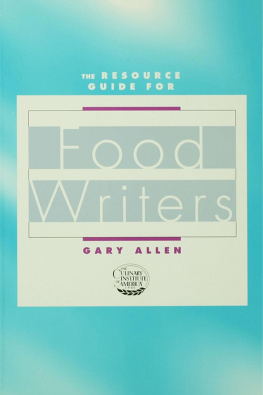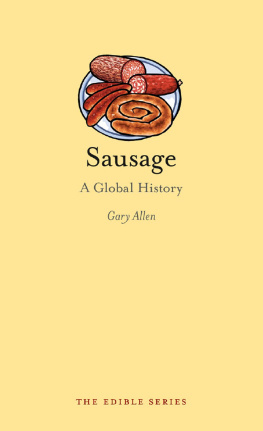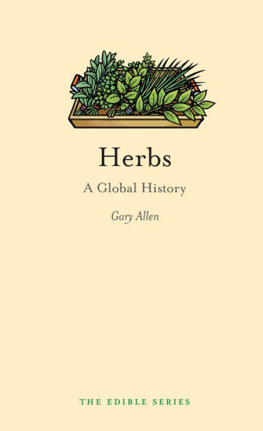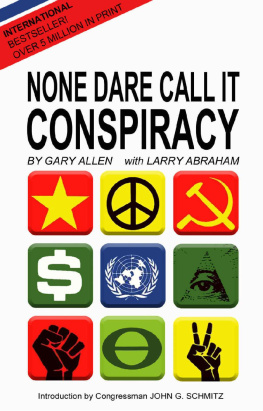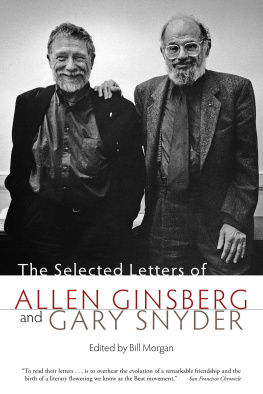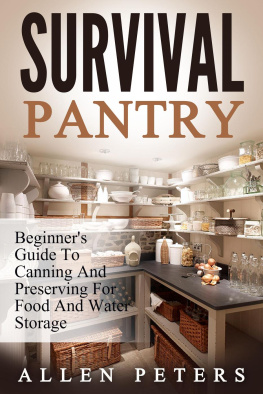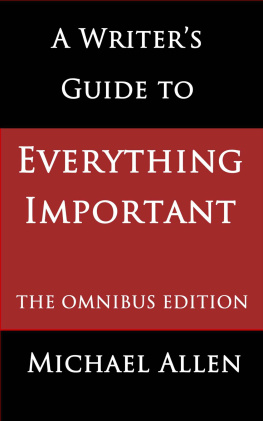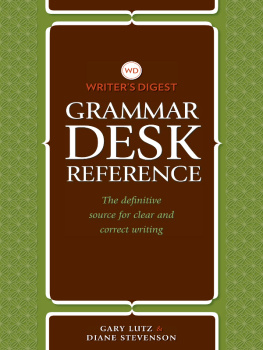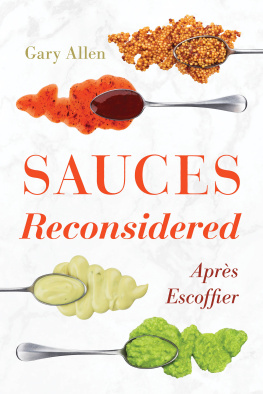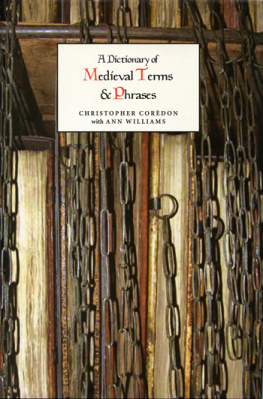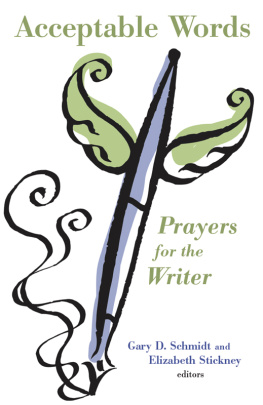The Resource Guide for Food Writers
THE RESOURCE
GUIDE FOR
Food
Writers
GARY ALLEN
Routledge
New York and London
Published in 1999 by
Routledge
29 West 35th Street
New York, NY 10001
Published in Great Britain by
Routledge
11 New Fetter Lane
London EC4P 4EE
Copyright 1999 by Gary Allen
All rights reserved. No part of this book may be reprinted or reproduced or utilized in any form or by any electronic, mechanical, or other means, now known or hereafter invented, including photocopying and recording or in any information storage or retrieval system, without permission in writing from the publishers.
Library of Congress Cataloging-in-Publication Data
Allen, Gary (Gary J.)
The resource guide for food writers / by Gary Allen.
p. cm.
Includes bibliographical references and index.
ISBN 0-415-92250-X (pbk.)
1. Cookery-Authorship-Directories. 2. Food Industry and trade-Directories.
I. Title.
TX644.A451999
808'.066641dc21 98-48507
CIP
Knowledge is of two kinds. We know a subject ourselves, or we know where we can find information upon it.
Samuel Johnson
Foreword
With so much curiosity about the subject of food, it's surprising that there has never been a resource that aids in connecting those interested in gastronomy to additional media sources that can fill their needs. We are all faced with so many challenges today that the search for how and where to find information should not be one of them. With that in mind, The Resource Guide for Food Writers was written.
The information and work that goes into writing a recipe, a book, or the content for a television cooking show are akin to the ingredients that are grown, harvested, and used in preparing a dish or a meal. The ingredients must be of the highest quality, be appropriate to the intended dish, and be combined in such a way that the final presentation is flawless, if one is to create a feast for the mind, body, and soul. It is only with a tremendous amount of knowledge, often requiring research, that a chef or a writer can create/produce a literary or gastronomic feast. Ideas, ingredients, preparations, and techniques must be thoroughly explored before one can actually cook. It is only after information has been obtained, compiled, and understood that the next step may be taken. Then and only then can the chef begin to cook and the writer, write.
The Resource Guide for Food Writers is a compendium of useful information for writers, students, and those with an interest in gastronomy, who want to learn more about food and have the desire to share that newfound knowledge with others. The Resource Guide for Food Writers educates and enlightens. This resource is an essential research tool for all culinary enthusiasts, and I have no doubt that it will have enormous appeal to professionals and nonprofessionals alike in answering cuisine queries and in guiding gastronomic quests.
Tim Ryan
Executive Vice President, The Culinary Institute of America
Acknowledgments
First, my thanks go to Cynthia Lewis; without her original suggestion and guidance, this book would not exist.
Second, to Suzanne Hamlin, whose enthusiasm for food (and probably everything else worthwhile) is boundless. Without her encouragement, this book would be nothing more than a notebook on the shelf next to my computer.
For their motivation and loaned material, stories, and insights, additional thanks go to Lisa Becker, Joseph Carlin, Daniela Cole, Mary Cowell, Robert DelGrosso, Kathleen Ellis, Carole Ford, Judy Gerjuoy, Markus Heidelberg, Chef Big Jim Heywood, Lynn Kerrigan, Steven Kolpan, Roberto Landazuri, Steve Lewis, Chef Jonathan Zearfoss, and the late Karen Allison.
Thanks also to the libraries (and always helpful librarians) of the Culinary Institute of America, the State University of New York at New Paltz, and Vassar Collegeas well as to the hundreds of libraries that have made their catalogs available online to researchers everywhere.
Special thanks go to Deborah Begley and Tamara Watson, who, beyond the kinds of help described above, volunteered (or allowed themselves to be coerced) to read over this and other books-in-the-making. Their innumerable valuable suggestions and boundless optimism (not to mention their exquisite taste in and generosity with wine) are always appreciated.
Paul Canales, likewise, volunteered to look over the manuscript, sharing his invariably keen insights, while pretending that my requests were not the impositions they must have been.
I am, and the users of this book should be, grateful to Peter Capek. His sharp editorial eye and insistence that form follow function led to alterations that make the book easier to use. Melissa Rosati at Routledge made countless suggestions for ways to improve the book, making it a much more useful tool than I could have imagined on my own.
Finally, I want to thank my mother, Billie, whose self-described League of Nations approach to cooking is responsible for my lifelong interest in food; my father, Jack, who somehow managed to keep food on the table during the prolonged feeding frenzy that characterized my adolescence (and, along the way, introduced me to the joys of hot chiles); and especially my wife, Karen Philipp, who has been a willing (or only mildly protesting) consumer of countless culinary experimentstoo few of which have been unqualified successes. Her almost saintly forbearance while I spend years in obsessive (and ostensibly purposeless) activities is remarkable.
Introduction
We taste with our brains, not our tongues.
People are not born with predefined sets of likes and dislikes for specific foods, so it follows, naturally, that these likes and dislikes must be learned. While most people develop their opinions about food without reading a single word about the subject, gastronomers make great efforts to understand the most subtle nuances of the subject. For gastronomers it is only a short step from their fondness for food to a desire to share their culinary insights with others, in writing. In order to write effectively, they need more than educated palates and the urge to write.
Readers of such writing expect something more substantial than Mmmmmm, yummy!
Today's food writers must be able to support their observations with facts of many kinds. Certainly, anthropological, ethnological, geographical, historical, and linguistic aspects of the subject need to be addressed in order to provide the necessary contexts for an understanding of the subject. Technical considerations, such as the means of acquisition, nutritional properties, and preparation of foods, should be considered. A grasp of the botanical and zoological aspects of food may even be required if we intend to understand what we eat.
Progressing up the evolutionary ladder from glutton to gourmand to gourmet to gastronomer reflects an increasing need for information about the foods we enjoy. Just as a dish becomes more sophisticated with the addition of appropriate sauces, accompaniments, and garnishes, so is our appreciation of a cuisine enhanced by the knowledge we have of the cultural milieu in which the dishes evolved. One can think of these facts as metaphorical sauces, accompaniments, and garnishesinvisible, odorless, tasteless in themselves, but acting as catalysts that activate higher levels of gustatory delight. The food writer's occupation is the serving forth of these invisible, odorless, tasteless (but essential) condiments.


